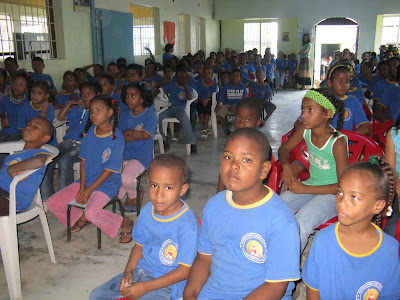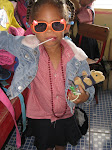


Our first destination is in Cien Fuego, a barrio built against the garbage dump of the large city of Santiago. As we bump along the pitted dirt road in our air-conditioned SUV, we start to feel uncomfortable as we gaze out at the pitiful rows of makeshift homes. The living conditions worsen the closer we get to the dump, and finally we stop in a neighborhood aptly named "La Mosca" -- The Fly.
Crude shacks are lined up almost as far as the eye can see, and an enormous mountain of city trash looms above them. There is no running water or electricity to these homes, and we see women and children carrying buckets of "non-potable" water from a community faucet.
We are led to a concrete building--above the door is a painted sign: Programa Niños Con Una Esperanza. We have not been prepared for this and we have no idea what to expect. The room is filled with rows of Dominican children in bright blue T-shirts. The 15 of us are led to the front of the room as honored guests. As we pass the chidren, they smile at us with sparkling dark eyes, and some shyly wave. We reach the stage, turn around to face the more than 100 pairs of eyes, and are overwhelmed. Pastor Pablo, who runs the program, gets up to explain. These children cannot go to school, he says, because they do not have documented birth certificates. Most of them live with one relative or another and survive by picking plastic, paper, and metal out of the dump for recycling. Their meals come from what they find in the garbage as well. It is not uncommon for children to be run over by the garbage trucks or burned by trash fires.
Pablo started what he calls his school because he believes children should not work. He says when he meets these kids they are sin esperanza o sueños--without hope or dreams. He works to build their self-esteem, put healthy food in their bellies, and give them a future. The program serves 265 children now, and provides them one meal a day of bread and milk.
The small, rough concrete building with rusty-railed, uneven steps would probably be deemed uninhabitable in the U.S. Here, it is palatial. Pablo leads the children in songs of greeting: Yo tengo un amiga quien se llama Tara. Hola, Tara! Three children come forward to formally thank us for visiting them. Their faces are sweet, their smiles sincere. All of them give thanks to God for the hope they now have, and then come around for handshakes or hugs.
When we step outside to go back to the car, we step over water carrying all sorts of waste down the gutters of the dirt road. José has found a nearby corner store with bottled water, and hands us agua fria along with the warning to sanitize our hands and reapply repellent. Dengue fever is a serious problem in this area, along with multiple parasites, viruses, and bacteria.
I feel a bit sick as I leave the kids behind, with my water bottle in hand, money in pocket, skin sanitized, and mosquito repellent applied. I am amazed by Pastor Pablo's commitment to help these children, and I'm glad for the local Rotario Santiago Monumental members who fund his work. May God increase their workers and their funds.








No comments:
Post a Comment